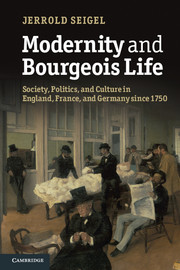 Modernity and Bourgeois Life
Modernity and Bourgeois Life Book contents
- Frontmatter
- Contents
- Illustrations
- Preface
- 1 Introduction: ends and means
- Part I Contours of modernity
- 3 Monarchical centralization, privilege, and conflict: France
- 4 Localism, state-building, and bürgerliche Gesellschaft: Germany
- 5 Modern industry, class, and party politics in nineteenth-century England
- 6 France and bourgeois France: from teleocracy to autonomy
- 7 One special path: modern industry, politics, and bourgeois life in Germany
- Part II Calculations and lifeworlds
- 9 Men and women
- 10 Bourgeois morals: from Victorianism to modern sexuality
- 11 Jews as bourgeois and network people
- Part III A culture of means
- 13 Bourgeois and others
- 14 Bourgeois life and the avant-garde
- 15 Conclusion
- Notes
- Index
10 - Bourgeois morals: from Victorianism to modern sexuality
Published online by Cambridge University Press: 05 June 2012
- Frontmatter
- Contents
- Illustrations
- Preface
- 1 Introduction: ends and means
- Part I Contours of modernity
- 3 Monarchical centralization, privilege, and conflict: France
- 4 Localism, state-building, and bürgerliche Gesellschaft: Germany
- 5 Modern industry, class, and party politics in nineteenth-century England
- 6 France and bourgeois France: from teleocracy to autonomy
- 7 One special path: modern industry, politics, and bourgeois life in Germany
- Part II Calculations and lifeworlds
- 9 Men and women
- 10 Bourgeois morals: from Victorianism to modern sexuality
- 11 Jews as bourgeois and network people
- Part III A culture of means
- 13 Bourgeois and others
- 14 Bourgeois life and the avant-garde
- 15 Conclusion
- Notes
- Index
Summary
Few features of classic bourgeois life have been more remarked on and bewailed than its morality, often derided as rigid, puritanical, and hypocritical, especially in regard to sex. Nineteenth-century moralists made large demands on speech and behavior in the name of decency and decorum, often in strikingly inconsistent ways. Men were allowed satisfactions considered unthinkable for women; representations of unclothed bodies were taken for granted so long as they could be assigned to some distant or mythical realm, but moralistic viewers were shocked by Manet’s ironic and playful contemporary nudes (in contrast to Mauclair’s celebration of them), and even by the suggestion of a falling gown-strap on the bare shoulder of an elegant woman in a portrait by John Singer Sargent. We can defend bourgeois morality on the grounds that many human societies have imposed narrow and inflexible standards of propriety on dress, demeanor, and public expression, especially for women, and that hypocrisy has reared its head wherever ordinary flesh-and-blood humans have sought to exhibit strict moral and religious principles in their daily lives. Bourgeois themselves were the first to call attention to hypocrisy in their midst, condemning it in the name of transparency and truth. In addition, Peter Gay’s detailed and colorful studies have shown that many nineteenth-century middle-class women and men lived far more open and varied moral lives than has commonly been supposed, often regarding sensual and erotic satisfactions as a highly desirable part of respectable existence. Even his account leaves many features of the traditional picture intact, however, and with them the need to make sense of the perplexing contours of modern bourgeois moral belief and behavior.
- Type
- Chapter
- Information
- Modernity and Bourgeois LifeSociety, Politics, and Culture in England, France and Germany since 1750, pp. 336 - 375Publisher: Cambridge University PressPrint publication year: 2012


